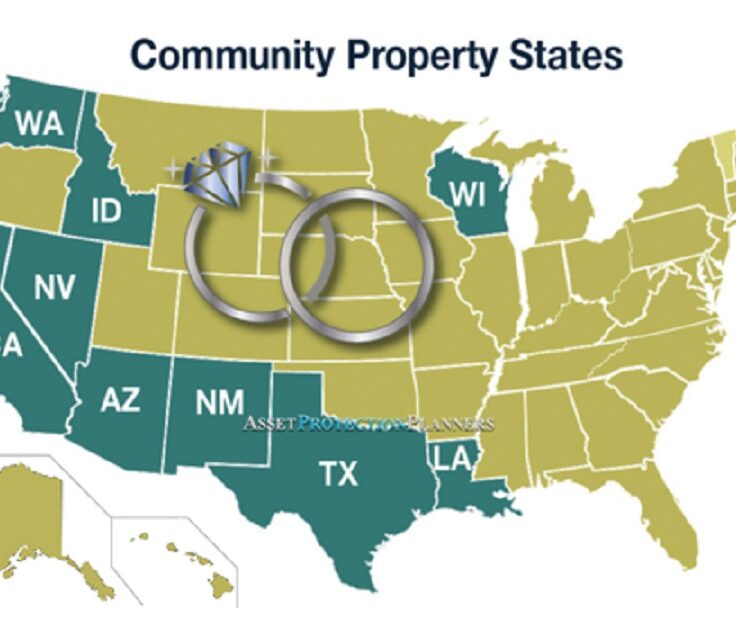Rhode Island Cohabitation and Property Rights Explained
Living together without getting married has become quite common nowadays. Many couples opt for this arrangement, particularly if they want to test the waters before making a lifelong commitment. Rhode Island, like other states has its own approach to dealing with the legal aspects of cohabitation, especially regarding property rights. However not everyone is aware of how this affects them personally. It’s not just about deciding who gets to keep the couch or the car; it’s also about safeguarding your emotional and financial well being. Let’s delve into how Rhode Island perceives cohabitation and what important things you should consider.
How Rhode Island Law Defines Property Ownership for Unmarried Couples

In Rhode Island the law doesn’t automatically grant cohabiting couples the same rights as married ones. If you’re living with someone without being legally married the property you share might not be treated the same way as it would be for a married couple. Rhode Island courts adhere to the principle of “ownership” for unmarried couples. This means that if your name isn’t on the deed the law may not acknowledge your ownership of that property.
However the situation is not so clear cut. If you can demonstrate that you played a role in buying or maintaining the property you may have a case to support your claim. Its a delicate matter though and having clear communication from the start is preferable. After all relationships can be unpredictable and nobody wants to go through a messy legal dispute following a breakup.
Here are some key things to note:
- No automatic property rights: If you’re not on the title, the property may not be yours.
- Contribution matters: You may need to prove your financial contributions.
- Living together doesn’t equal marriage: Rhode Island doesn’t recognize common-law marriage, so don’t assume cohabiting gives you legal rights.
Jointly Owned Property: What Happens After a Breakup?
Moving in together or pooling your resources to buy something can be a significant milestone in a relationship. However when things take a turn dividing those shared assets can become quite tricky. Typically jointly owned property is divided, equally but the situation isn’t always straightforward. Let’s say you and your partner purchased a house together each contributing to the down payment and mortgage. In Rhode Island unless you have a cohabitation agreement the property is usually classified as “joint tenancy.” This means both of you have an equal claim to it regardless of who contributed more financially.
However things can become more complicated. Perhaps one individual put in more effort into improvements or covered most of the mortgage payments. In situations like these it’s not unusual for disputes to emerge regarding who deserves a share of the property’s worth. Everyone’s experiences differ and I’ve witnessed friends go through this challenging journey—it’s never simple particularly when both sides believe they are entitled to a portion of the assets value. This is why it’s essential to have agreements documented, from the start.
Important factors to keep in mind when dividing shared assets
- Equal ownership: Unless otherwise stated, joint property is usually split 50/50.
- Contribution isn’t always considered: Courts may not weigh who paid more unless there’s proof of an agreement.
- Agreements matter: Having a cohabitation agreement can protect your rights in case of a split.
Property Acquired Before Cohabitation: Rights and Claims
One of the challenges of living with a partner is figuring out what happens to belongings you had before moving in together. For instance if you owned a car, a house or even furniture before your partner came along it’s normal to feel a bit protective about those things. After all you made those purchases independently. However when you start sharing your life and eventually your living space things can get a bit complicated.
Generally speaking the legal system tends to favor the rightful owner. However if your partner can demonstrate that they made substantial contributions they may be entitled to some compensation or a share in the property.
Important things to keep in mind:
- Ownership stays with the original owner: If you bought something before cohabiting, it’s yours unless you give part ownership away.
- Contributions may complicate things: If your partner can show they’ve made significant contributions, it may lead to claims.
- Always clarify ownership early on: A conversation about property and contributions can save you a lot of future headaches.
How Rhode Island Courts Handle Disputes Over Property
If things don’t go well between you and your significant other and you can’t see eye to eye on splitting your belongings the courts in Rhode Island may have to get involved. And let me tell you when it reaches this stage emotions can run deep. I’ve come across tales of individuals feeling caught off guard when they expected everything to be resolved smoothly only to end up disputing over who keeps the dining table.
When it comes to property disputes between couples living together Rhode Island courts usually take a few factors into consideration. They look at the ownership of the property and whether both parties contributed financially. The courts may also consider non contributions from one partner such as home renovations or maintenance. However the situation can become complicated without an agreement in place.
What Rhode Island courts look at:
- Legal ownership: The court prioritizes whose name is on the property title.
- Financial contributions: Evidence of who paid for what will be considered.
- Non-financial contributions: Work put into maintaining or improving the property may also be taken into account.
Protecting Your Rights Through Cohabitation Agreements
I have always thought that it’s better to prevent problems than to fix them and when it comes to living together an agreement can help avoid a lot of pain. A cohabitation agreement acts as a safety net. While you may not anticipate the relationship ending it’s reassuring to have one in place just in case. Cohabitation agreements in Rhode Island aren’t solely meant for the rich or those with a business mindset. They are designed for anyone seeking clarity and peace of mind.
These contracts outline ownership details, property division in case of a breakup and shared expense responsibilities. I have to confess it’s not the most charming topic to discuss. I recall my friend having a conversation with her partner to create one of these agreements. It was somewhat uncomfortable but she later mentioned that it brought them both a feeling of reassurance.
When you decide to move in with a partner it’s a good idea to have this talk sooner rather than later. The arrangement can include belongings you had before living together and anything you get together. This way you won’t be caught off guard if things don’t go well in the relationship. And lets be real who wouldn’t want to steer clear of added stress?
What should be included in a cohabitation agreement?
- Property ownership: Clear terms on who owns what.
- Financial contributions: How bills, mortgage payments, and other expenses will be handled.
- Division of assets: What happens to shared property if you break up.
Having a deal set up is similar to having a guide it helps both of you understand where you stand and reduces the uncertainties that come with sharing your life and living space.
Financial Responsibilities in a Cohabiting Relationship
When two individuals choose to cohabitate it’s not solely about sharing a living space but also about sharing the financial obligations that come with it. You might find yourself in scenarios where you have to divide expenses like bills, rent, groceries and even vacations. I’ve witnessed numerous couples who unknowingly slip into a routine that leaves one partner feeling weighed down while the other remains oblivious. And believe me when it comes to money matters if not openly discussed from the start it has a way of causing tension.
In Rhode Island couples living together aren’t legally required to split their finances. It all depends on what you and your partner agree upon. But things can get tricky if one person earns more or contributes more to the household. It can create feelings of resentment if not approached carefully. That’s why I always advise having a conversation about money, early in the relationship.
Here are a few suggestions on how to handle money matters when living together as a couple,
- Be open about income and expenses: Both partners should have a clear understanding of each other’s financial situation.
- Split expenses fairly: It doesn’t always have to be 50/50. Splitting based on income might be a better option.
- Create a shared budget: Planning together can help avoid surprises and financial stress.
Money has the power to either bring you closer together or drive a wedge between you. In my opinion how a couple manages their finances says a lot about their relationship. Being transparent and open about money matters right from the beginning helps maintain a harmonious connection.
Frequently Asked Questions About Cohabitation and Property Rights in Rhode Island
Living together raises a lot of questions, particularly regarding ownership. Although each situation is different there are some common issues that many couples encounter when they decide to cohabit. You may have pondered these questions as well. So lets delve into a few of them.
1. Does Rhode Island recognize common-law marriages?
No Rhode Island does not acknowledge marriages based on common law. This means that cohabiting for an extended period of time does not automatically grant you the same rights as married partners.
2. Can I claim part of the property if I contributed financially, but my name is not on the deed?
It could be a possibility. If you can show that you provided support, you may have a case. However this usually involves legal proceedings and the result is uncertain.
3. What happens if we break up and both our names are on the property?
If both of your names are on the property deed it is typically divided equally unless there is a cohabitation agreement that specifies a different arrangement.
4. Should we get a cohabitation agreement?
Absolutely! A cohabitation agreement is an idea to safeguard the interests of both individuals involved. It outlines aspects like ownership, contributions and the course of action in case the relationship comes to an end.
While these inquiries only touch on the topic they shed light on the concerns that couples living together often encounter. By posing the questions at this stage potential issues in the future can be avoided.
Final Thoughts on Protecting Your Property Rights
When it comes to cohabiting relationships safeguarding your property rights might not be the most romantic subject but it’s crucial. I believe that open communication in relationships is key, particularly regarding finances and ownership matters. Speaking from my own experiences the sooner you address these topics the smoother it is to prevent potential conflicts down the road.
Rhode Islands legal system doesn’t automatically safeguard couples living together. That’s why it’s crucial to take preventive measures. This could involve creating a cohabitation agreement openly discussing financial contributions or ensuring clarity in property ownership. These seemingly minor actions can spare you from significant emotional turmoil down the line.
I often tell my friends to be ready for surprises in life. While it’s not pleasant to consider the end of a relationship taking precautions legally can help you be prepared just in case. Ultimately safeguarding your property rights is just a way, of taking care of yourself.
Keep in mind that while your connection may be grounded in affection having some legal clarity can be beneficial!


